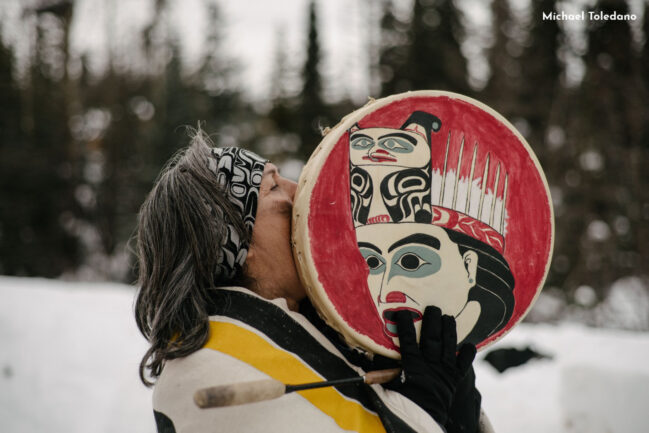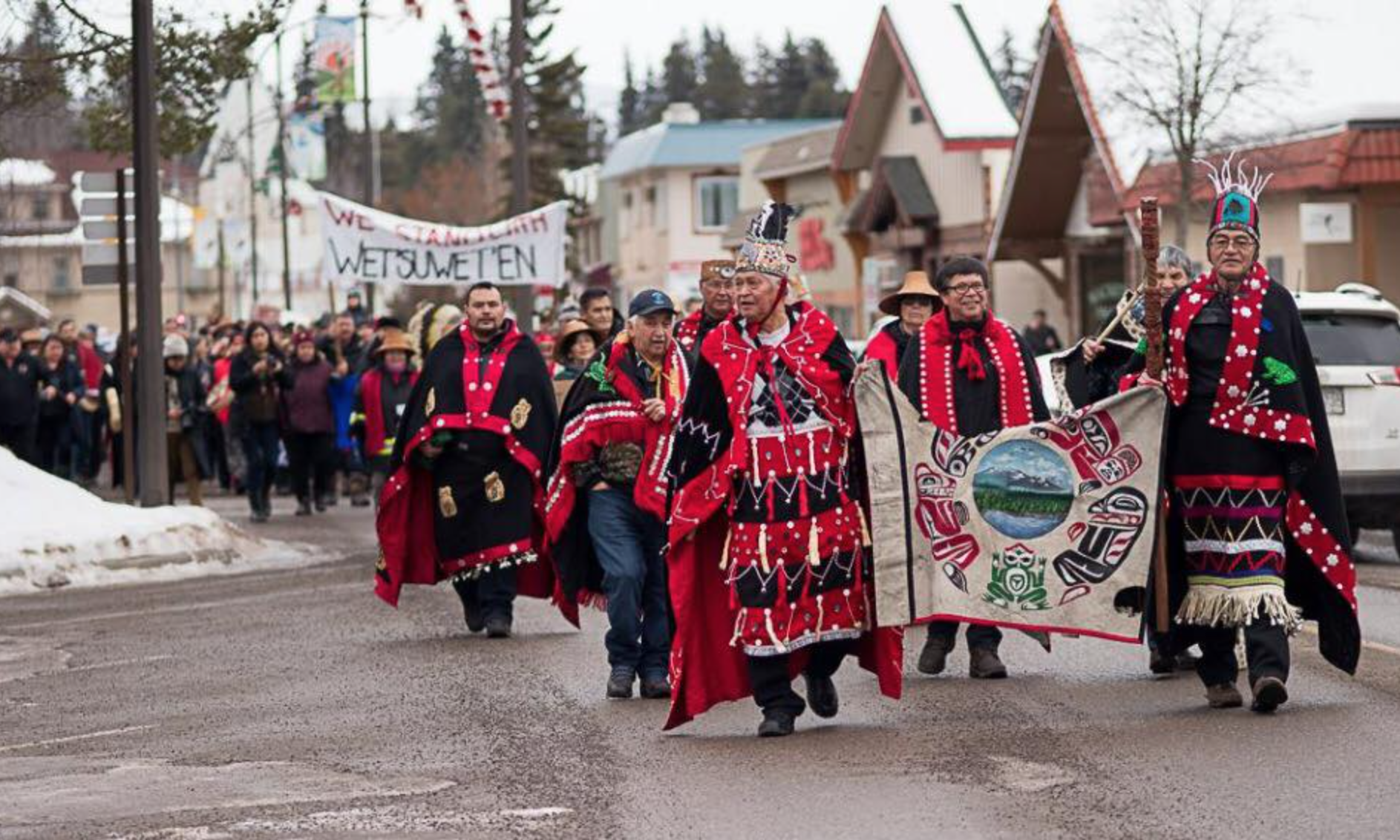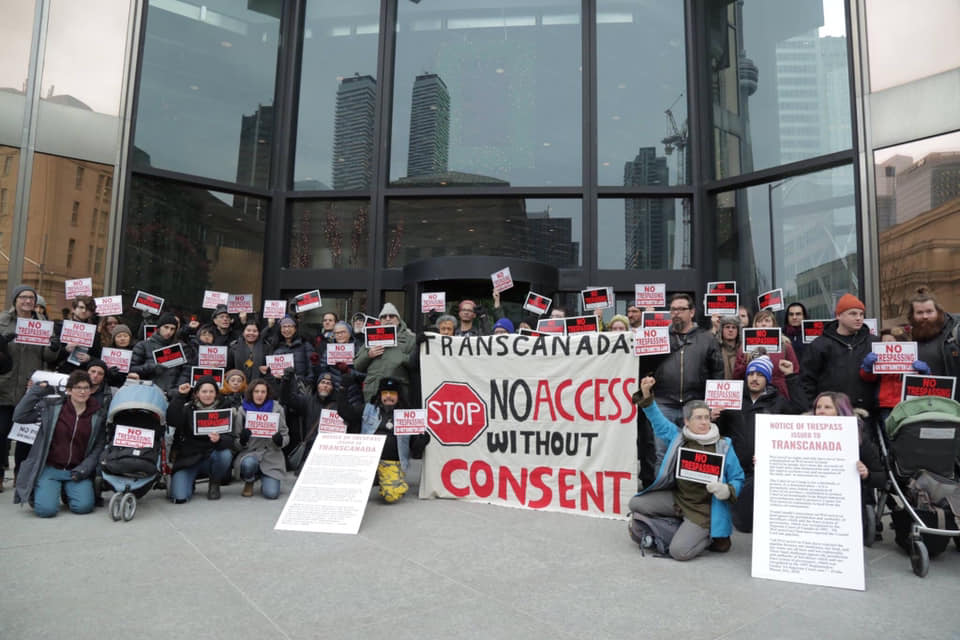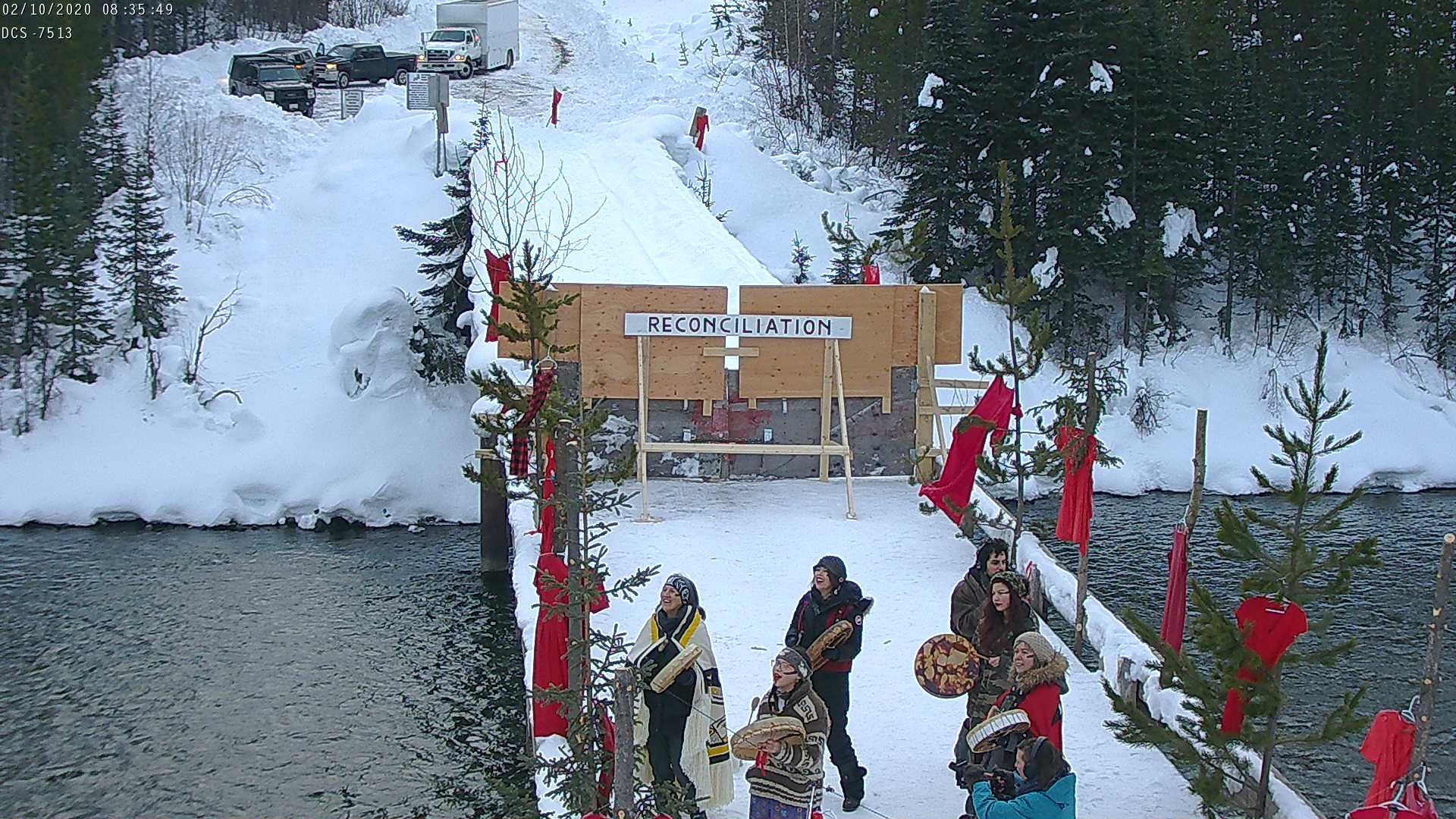
Image via Unist’ot’en Camp: RCMP are climbing the snow towards gate entrance, telling all present they will be arrested and face civil or criminal contempt. Matriarchs are calling the ancestors. February 2020
The pipeline project, owned by TransCanada / TC Energy, the province of Alberta, and KKR & Co., has garnered international attention due to protests by the Unist’ot’en (Dark House) of the Wet’suwet’en and their supporters, who say the pipeline crosses 120 miles of unceded First Nations lands.
Currently under construction, and one-third completed as of February 2021, the Coastal GasLink pipeline would carry fracked gas from the Dawson Creek area in northeastern British Columbia through the Canadian Rockies and other mountain ranges to the proposed LNG Canada facility near Kitimat, operated by Shell Canada and partners, where it would be prepared for export to global markets by converting the gas to a liquefied state – also known as LNG.
The Wet’suwet’en and supports had set up camps and a healing center along the proposed Northern Gateway pipeline route as far back as 2010, and the Unist’ot’en Camp was established in the path of that pipeline, and later Coastal GasLink as well. Once the project got a final investment decision in 2018, TransCanada appealed to the B.C. Supreme Court for an injunction to force the Wet’suwet’en camps to vacate their own unceded territory along the proposed pipeline route. After the courts granted a temporary injunction, in January 2019 a unit of heavily-armed Royal Canadian Mounted Police trespassed on the land of the Wet’suwet’en people and arrested 14 land defenders.
The Wet’suwet’en did not accept the injunction, sued Coastal GasLink/TransCanada over the destruction of their camp, and issued an eviction order to the RCMP and TransCanada / TC Energy to leave their unceded lands. Dozens more land defenders were arrested in early 2020 as RCMP returned to try to remove blockades at the behest of TransCaanda. Meanwhile, protests in support of #WetsuwetenStrong and #WetsuwetenSolidarity erupted in solidarity across Canada and internationally through early 2020 — including at the B.C. Legislature, Port of Vancouver, B.C. Premier Horgan’s house, and a series of rail blockades organized by the Mohawks of the Bay of Quinte First Nation and others that crippled the country’s passenger and freight rail systems and gained international attention.
TC Energy said in May 2021 that Coastal GasLink “continue(s) to expect project costs to increase significantly along with a delay to project completion,” said management. It had warned in February of coronavirus-related delays. Coastal GasLink will continue to mitigate cost increases and schedule deferrals and is working with LNG Canada on establishing a revised project plan and budget.”
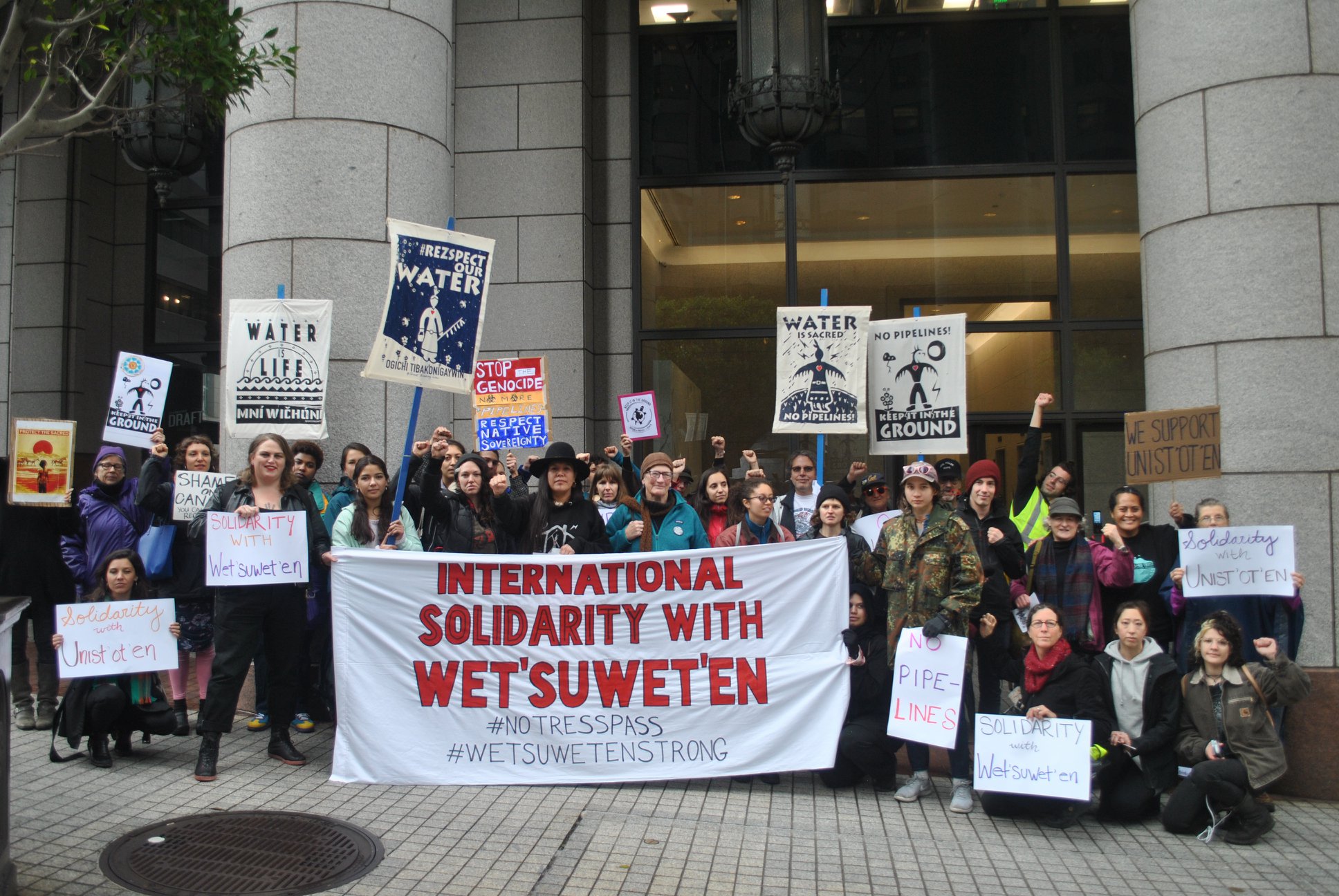
Image via Unist’ot’en Camp: International Solidarity with Wet’suwet’en Action, February 2020
Recent Media Coverage:
- (Feb. 5, 2021): CBC: A year after Wet’suwet’en blockades, Coastal GasLink pipeline pushes on through pandemic
- (Oct. 29, 2020): Reuters: TC Energy sees higher costs for Coastal Gaslink pipeline
- (March 5, 2020): The Nation: ‘Ruin Our Territory—for What?’
- (Feb. 14, 2020): Huffington Post: Wet’suwet’en Coastal GasLink Pipeline Dispute: Every Word You Need To Know
Project Details
- Owner: Alberta Investment Management Company (32%, as Amicorp Group), KKR & Co. (32%), and TransCanada / TC Energy (35%)
- Capacity: 2,000-3000 Million cubic feet per day
- Length: 416 miles
- Diameter: 48-inches
- Cost: US $4.5 billion
- Status: PROPOSED
- Start Year: 2023
- Bank lenders: JP Morgan Chase, Bank of Montreal, Deutsche Bank, Canadian Imperial Bank of Commerce
- TransCanada / TC Energy has also separately secured financing from 17 banks via credit lines or bond sales, including: Alberta Treasury Branches, Bank of America, Barclays, Citi, Crédit Agricole, Credit Suisse, Desjardins, Export Development Canada, HSBC, Mizuho, MUFG, National Bank of Canada, Royal Bank of Canada, Scotiabank, SMBC, TD, and Wells Fargo.
Project Status
Landowners: Canada Energy Regulator Authority on “Right of Entry” Orders:
- Under the Canadian Energy Regulator Act, pipeline companies are only able to apply to obtain right-of-entry for lands required after the project is approved by the Canada Energy Regulator, the country’s federal energy agency (formerly the National Energy Board).
- The Canada Energy Regulator provides a process to address landowners’ concerns, but may ultimately grant a “right of entry” order, to allow a corporation onto landowners’ property against their wishes.
- The process is managed by the Pipeline Arbitration Secretariat, whose decisions may be appealed to the Federal Court, Federal Court of Appeal, and Supreme Court of Canada. According to the PAS, about half of all appeals have been won by landowners, and half by the pipeline company, or Minister of Natural Resources.
- According to Coastal GasLink, as of February 2021 the project is one-third completed, and construction is expected to pick up again in the summer of 2021.
Consultation & Aboriginal Title:
- Unlike in the United States, the Indigenous peoples of Canada — First Nations — have been afforded some greater rights under the country’s constitution and its interpretation by its Supreme Court, relative to the U.S., in the form of relatively more meaningful consultation with the government over how their lands may be accessed or utilized, compared to how Native American Tribal Nations are consulted by the U.S. government. Still, Canada has not fully implemented requirements laid out in the UN Declaration on the Rights of Indigenous Peoples.
- The concept of “Aboriginal Title” to lands in so-called Canada has been established by Supreme Court precedents after various First Nations filed suit seeking true free, prior, and informed consent for development projects like pipelines.
- No free, prior, and informed consent of the Wet’suwet’en people, as several hereditary chiefs whose traditional territory is on the proposed route oppose the project. [source]
- A conference between the Wetʼsuwetʼen, BC government and Canadian governments led to a provisional land rights agreement, but the pipeline is still opposed by the Wetʼsuwetʼen hereditary chiefs.
- “The dispute has highlighted a debate over whether hereditary chiefs should have more power under Canadian law. The Indian Act established band councils, made up of elected chiefs and councillors, who have authority over reserve lands. Hereditary chiefs are part of a traditional form of Indigenous governance that legal experts say the courts have grappled with how to recognize.” [source]
- TransCanada / TC Energy has secured agreements with 20 First Nations along the proposed pipeline route, after the government and company engaged in consultation with local band councils as part of the planning and environmental review process between 2012-2014.
- March 2020: The Union of B.C. Indian Chiefs (UBCIC) issued an open letter urging federal and provincial governments to pause pipeline construction during the ongoing Coronavirus pandemic (COVID-19). The letter cites concerns over the movement of non-local construction workers into the area and “man camps,” which is contrary to what health officials have recommended.
Outstanding Permits:
- June 2020: British Columbia’s Environmental Assessment Office (BCEAO) found that Coastal Gaslink had commenced pipeline construction through hundreds of wetlands without first completing the required environmental fieldwork. BCEAO issued a “cease and remedy” order for any construction activities within 30m of one of these protected wetlands, and that further assessments must be undertaken for both the damaged wetlands and the wetlands yet to be impacted by construction.
- October 2018: B.C. Premier John Horgan announces provincial support for the project.
- The BC Oil and Gas Commission (BCOGC) granted all necessary permits 2015-2016.
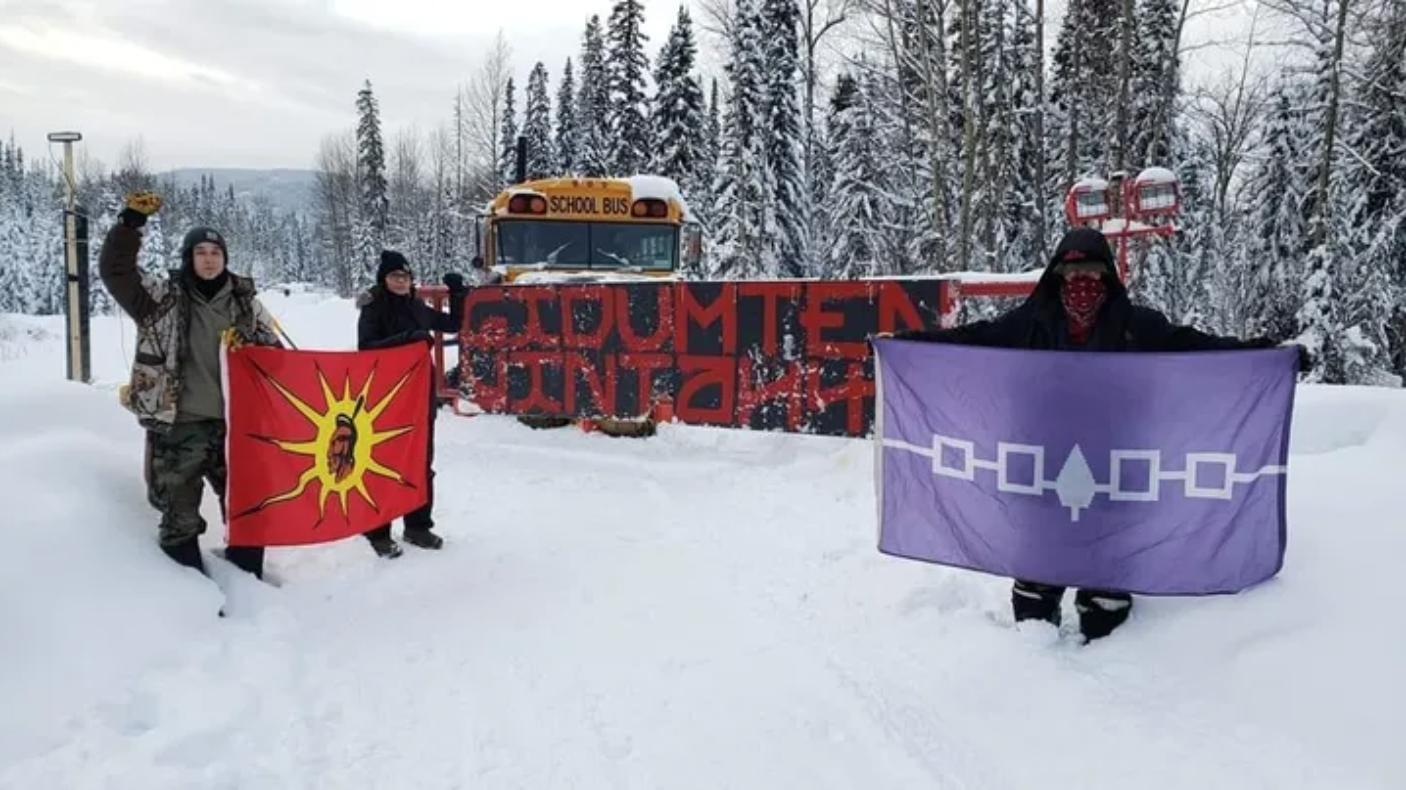
Wet’suwet’en Hereditary Chiefs Evict Coastal GasLink from Territory, Jan. 4, 2020 (Photo: YintahAccess.com)
Impact Litigation / Court Fights:
- Federal Court:
- April 2021: B.C. Supreme Court Justice dismisses challenge by Wet’suwet’en hereditary chiefs that British Columbia’s Environmental Assessment Office failed to account for complaints of non-compliance by CGL on the work that had been conducted up to that point, and failed to consider the findings of the Missing and Murdered Indigenous Women and Girls Inquiry that “bear directly” on the project. [source]
- October 2020: The Wet’suwet’en challenge the 2019 extension of the pipeline’s certificate at Canada’s Supreme Court, on the grounds that British Columbia’s Environmental Assessment Office did not meaningfully address the findings of a 2019 report from the National Inquiry into Missing and Murdered Indigenous Women and Girls when it approved the extension. [source]
- July 2019: Wet’suwet’en Nation clan files lawsuit over destruction of Gidimt’en camp in wake of RCMP standoff [source]
- 2018: TransCanada appeals to the B.C. Supreme Court for an injunction to force the Wet’suwet’en camps to vacate their own unceded territory along the proposed pipeline route. After the courts granted a temporary injunction, in January 2019 a unit of heavily-armed Royal Canadian Mounted Police trespassed on the land of the Wet’suwet’en people and arrested 14 land defenders.
[Select information and map data excerpted from Global Energy Monitor, with permission and Creative Commons license.]


